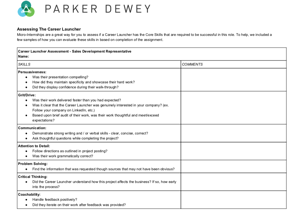Guide to Entry-Level Hiring
Software Engineer
Software Engineer
After reviewing thousands of open software engineer roles (software developer, programmer, coder and software architect are similar titles), we’ve identified the most common responsibilities outlined in software engineer job descriptions:
While these are specific responsibilities or requirements, what’s missing are the skills required to successfully execute them, which is especially important for entry-level hires who don’t have the professional track record and where GPA or major doesn’t demonstrate them. To help, we’ve worked with human capital leaders and marketing executives to map the underlying skills to the typical responsibilities below:
|
RESPONSIBILITY |
SKILLS |
|
| Execute full software development life cycle (SDLC) | Grit/drive | Execution |
| Develop flow charts, layouts and documentation to identify requirements and solutions | Problem solving | Analytical mindset |
| Write well-designed, testable code | Creativity | Strategic thinking |
| Deploy programs and evaluate user feedback | Communication | Presentation |
| Comply with project plans and industry standards | Attention to detail | Organized |
| Collaborate with business lines to understand user needs | Team player | Empathy |
Many of these skills can’t be measured from a GPA, aren’t captured on a college student or recent grad’s resume, and can’t be assessed through an interview process, especially those Core Skills that often make the difference. In reality, the only way to evaluate these skills is when you see these candidates in action. Micro-Internships are a perfect, easy, low-risk and low investment way for employers to see candidates demonstrate these skills first hand.
Building upon this, we have crafted and tested a handful of Micro-Internships that not only provide hiring manager with immediate value, but also will help you uncover these skills:
We would like you to do quality control testing on our website. The specific areas will be provided. Please document the process you used to complete the quality testing along with your findings.
We would like for you to make updates to our current site. We will provide the specific areas of the site that need updating - specifics include stylistic, image and content updates.
We have provided several existing queries for our database. We would like for you to revise these queries to make them more efficient.
In order to help you pick the best candidate, you can also ask a question or two to screen the applicants - while not required, this is a great way to quickly learn about the candidates so you can select the best career launcher for your project. Here are the following we would recommend:
While there may not be any “right” answer, these types of questions allow a Career Launcher to stand out by conveying an insightful perspective or passion for the role.
Assessing The Career Launcher
As highlighted above, these assignments are a great way for you to assess if a Career Launcher has the Core Skills that are required to be successful in this role. To help, we included a things to look for in what the Career Launcher provides.
Download the full assessment here.

Win. Win.
The benefits are invaluable. As a result of the Micro-internship you will get:
Of course this is not just limited to software engineering roles. You can see some additional examples tied to other roles or departments here.
© 2026 Parker Dewey LLC